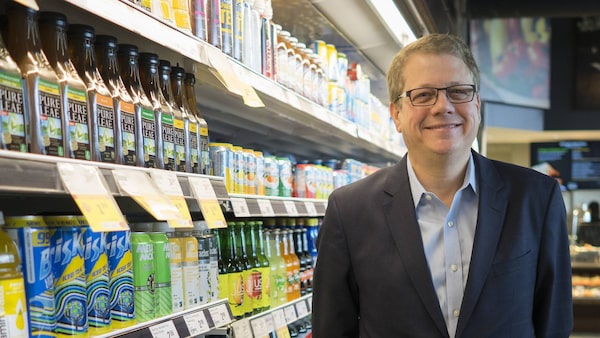
Michael Medline, chief executive of Empire Company Ltd., which owns Sobeys, told MPs his company is prepared to reinstate the pay premium in regions that return to severe lockdown.J.P. Moczulski/The Globe and Mail
Senior executives at three major Canadian grocery store chains appeared before a parliamentary committee to defend cutting COVID-19 pay premiums for workers, saying the wage bump was always intended as a short-term measure and was withdrawn as pandemic-instigated lockdowns eased across the country.
“It was a temporary program – during the heat of the pandemic – and it was communicated that way,” Michael Medline, chief executive of Empire Company Ltd., which owns Sobeys, told the House of Commons industry committee Friday. He appeared along with executives from Loblaw Cos. and Metro Inc.
Mr. Medline also told MPs his company is prepared to reinstate the pay premium in regions that return to severe lockdown.
“Should this terrible virus rear its ugly head to the degree that provincial authorities in certain regions of a province go back to lockdown like we experienced in March and April, we will put hero pay back into our company stores in those regions or cities,” he said. “That would be the right thing to do.”
The premium amounted to $2-per hour. It was introduced by grocery chains in early March amid a wave of panic buying of items such as toilet paper, hand sanitizer and flour. Many grocery chains ended the premium in the first half of June, with a number announcing their decision in the same short period.
The hearings, prompted by a motion by Liberal MP Nathaniel Erskine-Smith, have raised questions about the timing of the pay premium reduction and whether companies co-ordinated their decision to end the wage bump. Mr. Erskine-Smith said he wants to ensure there was no collusion, meaning the illegal practice of companies making secret agreements to work together to influence a market.
All three executives were emphatic that their decision to cut the premiums in early June were taken independently and not co-ordinated.
Two of them said they communicated with other grocery chains regarding the pay premiums. But they said they did not not exchange confidential information. Sarah Davis, president of Loblaw, said she sent an e-mail to other grocers after her company made its decision to end the premium, but she said Loblaw had already informed its employees and so the information was no longer secret.
“I did send a courtesy e-mail to Walmart, Save-On Foods, Metro and Sobeys notifying them of our decision – recognizing that after telling 200,000 employees the news would be public immediately.”
Metro CEO Eric La Flèche told MPs he contacted counterparts at other grocery chains to ask whether they planned to extend COVID-19 pay premiums. He said they replied they had not made a final decision and that these communications did not inform his company’s own decision.
Earlier this week Jerry Dias, Unifor national president, told MPs that the pay premium cut was unjustified because the threat from COVID-19 is not gone. Unifor represents 315,000 workers in Canada, including 20,000 in the retail and whole-sale sector.
“On the one hand it recognized the enormous safety risks these workers were taking by going to work. On the other hand, and let’s be frank here, it recognized that the majority of these workers earn very low wages. Who in their right mind would risk contracting COVID in some cases for $11.32 an hour?”
Ms. Davis, however, explained that the wage bump was not hazard pay. “The premium pay was never about safety. If our stores were not safe we would never ask our colleagues to come to work.”
She said the premium was introduced for “for one simple purpose: We wanted to acknowledge the extraordinary volatility and uncertainty in our stores and supply chain – and the hard work it created.”
The Loblaw president rejected the idea that her company is benefiting from COVID-19. She said in an early April earnings call the company announced higher profits after “an unprecedented two-week customer buying binge” but she said huge monthly expenditures to address COVID-19 safety offset any gains.
The executives raised concerns about why Loblaw, Sobeys and Metro were being singled out for scrutiny but not, for instance, U.S. retailers in the Canadian market. Both Amazon.com and Walmart are major forces in Canadian retail.
Mr. Erskine-Smith said the Competition Bureau should investigate communications between grocers.
“We heard today about direct communication between CEOs on the subject of reducing pandemic pay and the evidence warrants an investigation from the Competition Bureau,” the Liberal MP said.
“What we didn’t hear was any reasonable explanation for how cutting the pandemic pay in the midst of record profits is consistent with their commitment to a living wage in this country.”
Know what is happening in the halls of power with the day’s top political headlines and commentary as selected by Globe editors (subscribers only). Sign up today.